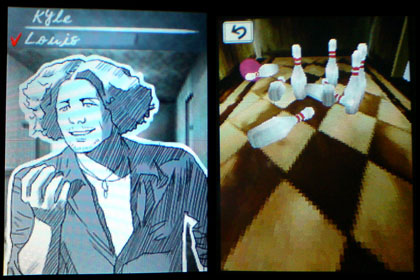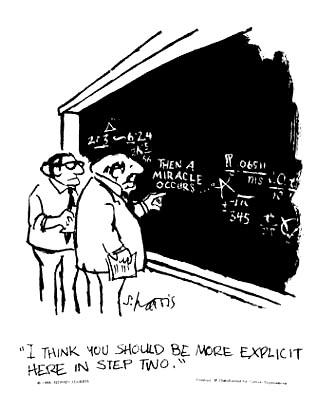I thought I post something real quick to liven this place up a bit. Recently, I have been playing Hotel Dusk for the DS which is game by the studio Cing, which also made Another Code (aka Trace Memory). It is a great and inspiring game and I want to write write about it some more. However, this time I will focus on a very stupid flaw of it which frequently occurs in other games as well: invisible causality.
Whee!… but wait, why are we doing this again?
The concept of causality is very simple: it is the logical connection between two events – cause and effect. It is the principle behind a feedback loop and thus extremely important for games. However, as far as story is concerned, sometimes game designers tend to look too much at movies where dramaturgy is more important then causality. Dramaturgy also deals with connections of events but it focuses on the arrangement of the events of a story to achieve an emotional impact rather then the logical connections between them. A series of events can be exciting but quite irrational and arbitrary.
What happens when game designers forget causality can be seen in two scenes in Hotel Dusk. In the game, you control a guy, who solves a few mysteries in a little hotel somewhere in the middle of nowhere. The game can be compared with traditional adventure games with lots of influence from Japanese interactive novels.
The following paragraphs might contain some very minor spoilers. Still, I encourage you to read on because at least for the following example, it is not worth saving your virginity.
Late in the story, a character challenges you to a bowling game. The bowling itself is poorly programmed and one of the weakest moments of Hotel Dusk, but that’s not my point. During that game, the other character accidentally breaks a vase with his bowling ball which reveals a very important clue to the mystery. The thing is that this event is triggered ONLY if you win the game. You can play as many games as you want: as long as you loose, no accident will happen. So the cause is winning the game, the effect is the accident.
This is ok from a standpoint of dramaturgy. A carefree, joyful moment (winning the bowling game) is suddenly interrupted by a catastrophe (accident) which reveals a mystery and drives the story forward. From a standpoint of causality it is just rubbish! There is no logical connection between winning the game and the accident! The accident could have happened just as well if the player lost.
The problem is that the events of the story do not reflect the underlying game mechanics. The mechanics require the player to overcome an obstacle to advance. As a reward, the story shows a random accident not related to the performance of the player. The player knows that his action caused something, but this causality is “invisible” in the story – a kind of invisible causality underneath the story.
It seems like a minor thing but we should bother because it screws up the feedback cycle. It teaches players to ignore the story and instead try find out on what they are really supposed to do. Players stop thinking logically (”I want X to happen so I should do Y”) but instead seek for randomly for challenges, things “to do”. They do things not because they understand the consequences but just because they are there.
In other words, because the feedback of the story is inadequate to determine the correct course of action, players will start to develop a Brute-force mentality to approach to all problems. Ironically, this exactly what adventure games are trying to avoid.
Invisible causality can have an even more serious effect when combined with negative feedback. Another example from Hotel Dusk illustrates the problem. The next example is yet another spoiler but I still encourage you to read on. I try not to give everything away.
In one of the final puzzles of the game, the player is trapped in an airtight room and slowly runs out of air. In the room, there are various items which the player is supposed to use to solve a puzzle. The funny thing is that the puzzle has absolutely nothing to do with getting out of the room. If the player solves the puzzle he uncovers an unrelated piece of information and is accidentally discovered and rescued by another character. If the player fails, he won’t be rescued.
In this situation, invisible causality can cause the player to get stuck and frustrated. Doing the logically correct thing (trying to get out of the room) is being punished – the player runs out of air and dies. Instead an invisible causality rewards the player for ignoring the very urgent problem and doing something completely unrelated. This grave design mistake punishes rational, foresighted thinking. It also diminishes the reward of getting out of the trap because the achievement is “invisible” in the story.
Invisible causality is something scientists like too…
Invisible causality happens when game designers get caught in tinkering with game mechanics and puzzles without paying attention to how their precious creations fit into the story. Instead of seeking ways of how to bond gameplay with the story, dramatic Hollywood solutions are loosely applied to the gameplay skeleton. It is a sign that game designers disregard the story. Interestingly, this attitude is being carried over to the players: they will too, start ignoring the story. As I mentioned earlier, this is fatal in an adventure game like Hotel Dusk.
Still, although its experience is tainted by such mistakes, Hotel Dusk remains a very good title and I will explain why in some other post.






I stopped at the second spoiler announcement because I don’t even want to know where I’d gonna be.
[...] Hotel Dusk: Invisible Causality – I never had a name for it, but the term “Invisible Causality” seems fairly appropriate when describing one of the more infuriating aspects common to adventure games. [...]
[...] http://gamedesignreviews.com/reviews/hotel-dusk-invisible-causality/ Posted in Blog [...]
[...] Hotel Dusk: Invisible Causality [...]
Thank you for this meaningful article, it was a pleasure reading it. Glad to see there are people to pay attention to this kind of things.